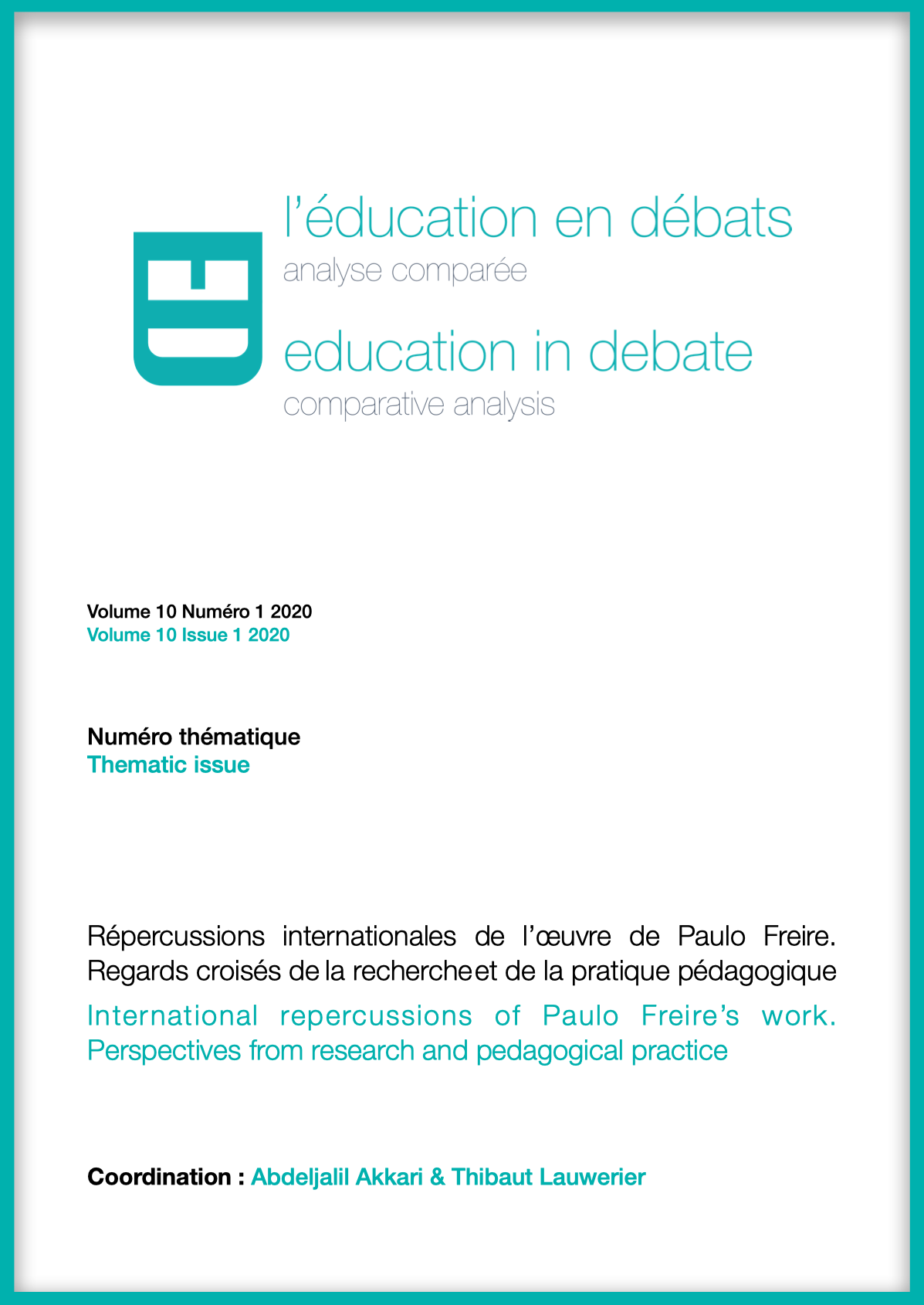Paulo Freire en tant que citoyen du monde
Les protestants de l’ISAL et les portes ouvertes du Conseil Œcuménique des Eglises
DOI:
https://doi.org/10.51186/journals/ed.2020.10-1.e272Abstract
Invited by the Ecumenical Council of Churches, Paulo Freire traveled to Geneva in February 1970, leaving behind him a teaching position at Harvard University in the United States. This leads us to propose an “archeological” explanation of his trajectory that began in Recife, his hometown, andmoved to Jaboatao (Recife -Pernambuco) during the Crisis of 1929. This path is linked to Freire’s proximity to a group of Latin American Protestant intellectuals before and during their stay in Santiago, Chile. This paper stems from a bibliographic and documentary research that is essentially based on the archives of the World Council of Churches and libraries in Geneva, Switzerland (Geneva Public Library) and in Brazil (Mario de Andrade -São Paulo; Pontifical Catholic University of Paraná -Paraná; Library of the theology faculty of the Methodist church in Brazil; Private archive of the author).
References
Alves, R. (2012). Por uma teologia da libertação. São Paulo: Ed. Fonte.
Brugaletta, F. (2017). El protestantismo y la circulación de la pedagogia de Paulo Freire en América Latina. Revista de Pedagogía crítica, 15(17), 21-40.
Buber, M. (1960). Eu e Tu. São Paulo: Ed. Centauro.
Buber, M. (1965). Dialogos y otros escritos. Zaragoza: Riopiedras Ediciones.
Burlamaqui. P. (1997). Ultima entrevista de Paulo Freire. Repéré à http://forumeja.org.br/node/1066
Calazans, F. & Terra, A. (1994). 40 horas de esperança. São Paulo: Ed. Atica.
Ceccon. C. & Paiva, M. (2012). Paulo Freire no exílio ficou mais brasileiro ainda. In M. Gadotti& P. Abrão, P., Paulo Freire: anistidado polítco brasileiro (pp. 7-11). São Paulo: Editora Livraria Instituto Paulo Freire.
César, W. A. (2011). Vida e compromisso com a igreja. Entrevista a Mundo Cristão. Repéré à https://guiame.com.br/gospel/mundo-cristao/waldo-cesarvida-e-compromisso-com-a-responsabilidade-social-da-igreja.html
Dussel, E. (2000). Ética da Libertação na Idade da Globalização e da Exclusão. Petrópolis: Vozes.
Fanon, F. (1991). Les damnés de la terre. Paris : Gallimard.
Foucault, M. (2005). Arqueologia do Saber. Rio de Janeiro: Forense Universitária.
Freire, P. (1970). Historique de mes activités et problèmes politiques au Conseil Oecuménique des Eglises. Document nº 992.1.1/0. Genève : Archives de la Bibliothèque du COE.
Freire, P. (1978). Os cristãos e a libertação dos oprimidos. Lisboa: Ed. Base.
Freire, P. (1979). Conscientização -teoria e prática da libertação: uma introdução ao pensamento de Paulo Freire. São Paulo: Cortez & Moraes.
Freire, P. (1980). Report on the work of Paulo Freire: visits meetings and contacts 1970-1979. Dossier nº 33. Genève : Archives du COE.
Freire, P. (1983). Educação como prática da liberdade. Rio de Janeiro: Paz e Terra.
Freire, P. (1986). Educação e mudança. Rio de Janeiro: Paz e Terra. Freire, P. (1997). Instituto Paulo Freire, 1997. Repéré à https://www.youtube.com/watch?v=J170pf5e5No
Freire, P. (2003). Pédagogie des opprimés. Paris : La Découverte.
Freire, P. & Ceccon, C. (1973). Conscientisation et révolution : une conversation avec Paulo Freire. Genève: IDAC.
Freire, P. & Guimarães, S. (2000). Aprendendo com a própria história II. São Paulo: Paz e Terra.
Freire, P. & Guimarães, S. (2011). A África ensinando a gente. São Paulo: Paz e Terra.
Furter, P. (1966). Educação e vida. Petrópolis: Vozes.
Furter, P. (1970). Lettre à Paulo Freire. Genève : Archives du COE.
Furter, P. (1986). Entretien avec l’auteur. Genève : FAPSE.
Gramsci, A. (1975). Quaderni del cárcere. Torino : Einaudi.
Lucas, A. Ministério de Jesus na Galileia. Novo Testamento/Bíblia de Jesuralém. São Paulo: Ed. Paulus, 2002.
Santos, A. (1962). La libération des opprimés. Conferência do Nordeste. Rio de Janeiro: Ed. Loqui.
Shaull, R. (1970). Foreword. In P. Freire., Pedagogy of theoppressed (pp. 29-36). New York: The continuum International publishing group.
Simbaña, R. (2015). Religión y política: protestantismo en América Latina. Quito: Ediciones Siglo XXI.
Werner, D. (2010). Ecumenical Learning in Global Theological Education – Legacy and unfinished tasks of Edinburgh 1910 Or: Contextuality, Inter-Contextuality and Ecumenicity as key mandates for ecumenical theological education in the 21st century historical and systematic. Geneva: ETE/WCC.
Downloads
Published
How to Cite
Issue
Section
License
Some rights reserved 2020 The Author(s)

This work is licensed under a Creative Commons Attribution-NonCommercial-NoDerivatives 4.0 International License.




